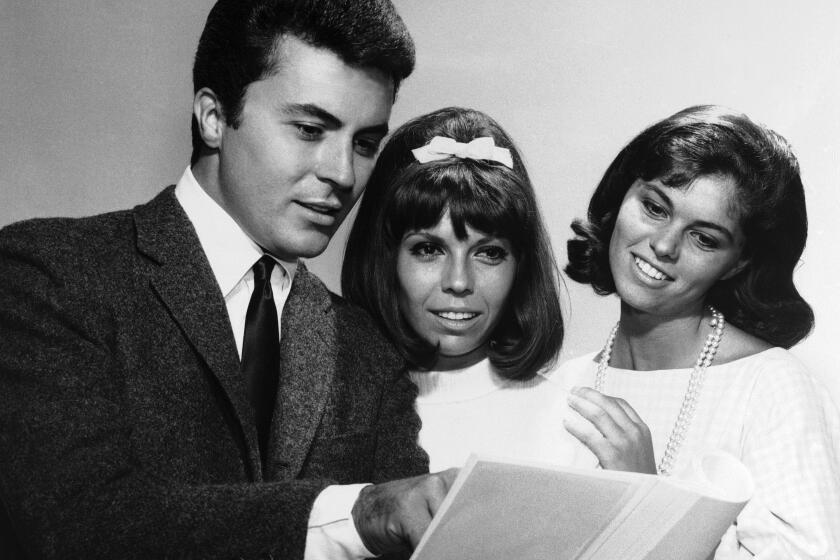Review: Marco Bellocchio’s Italian gangster epic ‘The Traitor’ feels bloated
Watching Marco Bellocchio’s “The Traitor,” Italy’s submission for the 2020 international film Oscar, it’s a bit dispiriting to think that this overlong, only sporadically inspired true-life crime saga was considered the best that the country, which has won more international film Oscars than any other, had to offer.
To be sure, every nation has stronger and weaker film years, so it may not be fair to expect annual entries at the level of “The Bicycle Thief,” “Nights of Cabiria,” “8½” or ”Cinema Paradiso,” to name but a few acclaimed, Italian-made honorees. (Not surprisingly, “The Traitor” did not make its category’s coveted shortlist.)
That said, its “official entry” status, as well as its film festival bona fides (it screened last year in Cannes, Toronto, New York and elsewhere), can’t help but raise expectations for this latest picture from Bellocchio, a veteran filmmaker known for such award-winning films as “Fists in the Pocket,” “A Leap in the Dark,” “Good Morning, Night” and “Vincere.”
Bellocchio, who directed and cowrote here (with Ludovica Rampoldi, Valia Santella and Francesco Piccolo) has often explored pointed sociopolitical themes in his work. “The Traitor,” his sprawling look at Tommaso Buscetta, the man who brought down the Cosa Nostra (he died in 2000), is not without its topical and historical heft.
But at a dense, often tiresome two and a half hours, the film, which takes place mainly throughout the 1980s and ’90s, too infrequently engages us in the chaotic lives and ruthless actions of its tangled web of mobsters who, save Buscetta, feel underdrawn and largely transposable. An on-screen “kill count” doesn’t quite clarify as intended.
The movie tracks how the imposing Buscetta, memorably played with a compelling mix of swagger, conviction and inscrutability by the bull-like Pierfrancesco Favino, went from Sicilian mafia head (a.k.a. Don Masino and “the Boss of Two Worlds”) to an informant whose fraught testimony led to indictments against 475 Mafia members and 338 convictions.
Unfortunately, the film picks up Buscetta’s story as his world begins its mighty and twisty descent — at a key moment in the Sicilian mafia’s involvement in the hyper-lucrative heroin trade — without giving us a sufficient sense of the power-mobster’s rise and operational prowess. We didn’t need a cradle-to-grave portrait but, for a character who plays such an outsize role here, more show than tell regarding “how he got there” may have helped our investment in his lurid tale. (There are several flashbacks along the way but they don’t do the trick.)
A war between Buscetta’s old-guard faction and its rival family, the Corleonesi, led by the merciless Totò Riina (Nicola Calì), eventually causes Buscetta to escape to Rio de Janeiro with his strong and devoted third wife, the Brazilian Cristina (Maria Fernanda Cândido, more please), and six of his children.
Meantime, back in Sicily, Buscetta’s adult sons, Benedetto (Gabriele Cicirello) and Antonio (Paride Cicirello), and brother are murdered by the Corleonesi. Soon after, Brazilian authorities raid Buscetta’s lavish home and, in one of the film’s more singular sequences, alarmingly strong-arm the capo for a confession. When that fails, Buscetta is extradited to Italy and ends up becoming an informer in return for his and his family’s safety, later entering the witness protection program in the United States.
But it’s in Buscetta’s revelations to investigating judge — and later friend — Giovanni Falcone (Fausto Russo Alesi) that we learn most about what makes the made man tick, even if his declarations about honor, dignity and right and wrong can seem more for the benefit of his interrogator than in the full service of truth.
The film’s centerpiece, the famed, Palermo prison-set, anti-mafia Maxi Trial that stretched from 1986 to 1992, is vividly presented as a wild spectacle filled with unconventional cross-examinations and testimony, witnesses such as Buscetta and fellow ex-gangster Salvatore Contorno (Luigi Lo Cascio) ensconced in bulletproof glass, and rows of cages housing a myriad of unruly mob defendants, all as a beleaguered judge presides. But like much else here, these scenes drag on and become bogged down by detail and process.
It’s true that, when it comes to epic mob movies, we may be a bit predisposed by the emotional sweep of the “Godfather” films or the exhilarating audiovisual stylings of Martin Scorsese in such works as “Goodfellas” and “The Irishman.” Still, it ultimately seems as if there was a more economical, propulsive and entertaining way for a master such as Bellocchio to recount this explosive and pivotal chapter of Mafia history.
'The Traitor'
In Italian, English, Portuguese and Sicilian dialect with English subtitles
Rated: R, for violence, sexual content, language and brief graphic nudity
Running time: 2 hours, 30 minutes
Playing: Starts Jan. 31, The Landmark, West Los Angeles
More to Read
Only good movies
Get the Indie Focus newsletter, Mark Olsen's weekly guide to the world of cinema.
You may occasionally receive promotional content from the Los Angeles Times.









